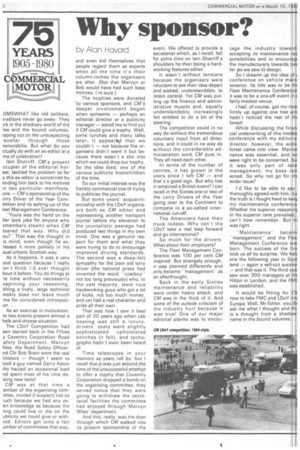Why sponsor? 1
Page 62

If you've noticed an error in this article please click here to report it so we can fix it.
by Alan Havard
and even kid themselves that people regard them as experts when all the time it's their column-inches the organisers are after. (Not that Mervyn or Bob would have had such base motives, I'm sure.) The trophies were donated by various sponsors, and CM's deeper involvement began when someone — perhaps an editorial director or a publicity manager asked me to find out if CM could give a trophy. Well, some lunches and many talks later, it appear1efl that we couldn't — not because the organisers didn't want it but because there wasn't a slot into which we could drop our trophy. So the idea died, one of the various publicity brainchildren of the time.
So our initial interest was the frankly commercial one of trying to publicise the journal.
But some years' acquaintanceship with the LDoY organisers both as CM editor and representing another transport journal before my elevation to the journalistic peerage had produced two things in my own mind. One was a genuine respect for them and what they were trying to do to encourage improved driving standards. The second was a deep-felt sympathy for the poor old lorry driver (the national press had invented the word "cowboy" not too long previously) who, in the vast majority, were nice hardworking guys who got a lot of kicks, not too much money, and yet had a real character and pride all their own.
That was how I saw it best part of 20 years ago when cab heating was still a Huxury, drivers' seats were slightly
sophisticated upholstered benches (it felt), and tachographs hadn't even been heard of.
Time telescopes in your memory as years roll by, but I recall that it was just around the time of the unsuccessful attempt to offer a trophy that Coventry Corporation dropped a bomb on the organising committee; they served notice that they were going to withdraw the secretarial facilities the committee had enjoyed through Mervyn Miles' department.
And this, really, was the door through which CM walked into its present sponsorship of the event. We offered to provide a secretariat which, as I recall, fell for some time on lain Sherriff's shoulders he then being a hardworking features editor.
It wasn't without tensions because the organisers were reluctant to see their idea depart and wished, understandably, to retain control. Yet CM was putting up the finance and administrative muscle and, equally understandably, increasingly felt entitled to do a bit of the steering.
The competition could in no way do without the tremendous voluntary input from all directions, and it could in no way do without the considerable administration work CM puts in. They all need each other.
In terms of the number of centres, it has grown in the years since I left CM — and that's a good sign. But why has it remained a British event? I can recall in the Sixties one or two of the Lorry Drivers of the Year going over to the Continent to compete in a so-called international run-off.
The Amercians have their truck rodeos. Why can't the LDoY take a real leap forward and go international?
So much for the drivers. What about their employers?
The Fleet Management Conference was 100 per cent CM inspired. But strangely enough, it was planned differently and only became "management" as an afterthought.
Back in the early Sixties maintenance and reliability were under heavy attack, and CM was in the thick of it. And some of the outside criticism of the industry hurt because it was true! One of our major editorial planks was to encou
rage the industry toward! accepting its maintenance res ponsibilities and to encourag( the manufacturers towards bet ter (as we saw it) design.
So I dreamt up the idea of conference on vehicle main tenance. Its title was to be th( Fleet Maintenance Conference it was to be a one-off event in fairly modest venue.
I had, of course, got my nos( firmly up against one tree an( hadn't noticed the rest of th( forest!
While discussing the finan cial underwriting of this modes conference with my editoria director, however, the wide forest came into view. Mainte nance was essential, and WE were right to be concerned, bu it was only part of tote management, my boss rea soned. So why not go for thf wider issue?
I'd like to be able to say thoroughly agreed with him, bu the truth is I fought hard to keel my maintenance conference Whether his superior reasonini or his superior rank prevailed, can't now remember. But 1-1( was right.
"Maintenance" becam( "management" and the Flee Management Conference vvai born. The success of the firs took us all by surprise. We hek one the following year in Scot land — again a sell-out succes: —arid that was it. The third yea saw over 300 managers at thl Hilton in London, and the FM( was established.
It would be fitting for Cl1l. now to take FMC and LDoY int( Europe, Well, Mr Editor, you dic ask me what I thought and thi is a thought from a shadow. name in the bound volumes . .
































































































































